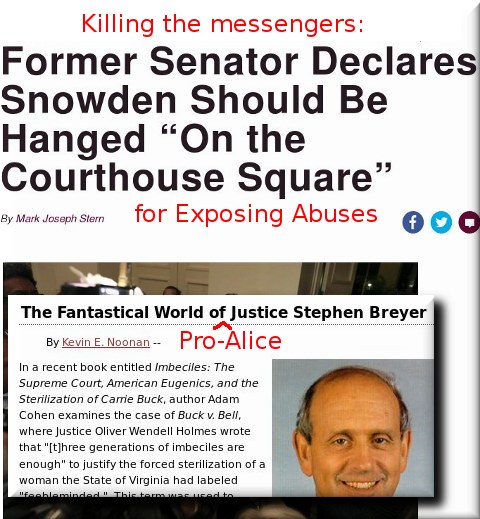

THE patent landscape surely came under long-overdue judgment and certainly it is changing. It's changing quite rapidly. It is not changing in favour of patent law firms, that's for sure; it's actually the other way around as these firm are trying to adapt to these recent changes and learn new tricks -- if any exist at all (here is Alexander P. Ott from McDermott Will & Emery trying new tricks to patent software in spite of the rules this week) -- in order to pretend that everything is the same as before and ultimately convince examiners/judges likewise. As we have shown in recent months, this rarely works anymore and they have very little control over what PTAB does (appeals by the patent holder/s are rare and usually ineffective). The figures and the facts are out there, but patent lawyers actively suppress them and even attack the messengers. For few instances of this, see the example above (Breyer) and recall more recent insults. It makes patent law firms look rather mean-spirited and vindicative. They're like a pack of hyenas now.
"The figures and the facts are out there, but patent lawyers actively suppress them and even attack the messengers."As one might expect, uncertainty over a large proportion of patents (existing and prospective/pending) reduces confidence among patentors. They might as well not bother attempting to patent (or renew patents on) abstract things like "something on a device" or "something over the Internet" (notorious but ubiquitous types of patents). There's plenty of prior art therein and usually no inventive step, just the 'dressing up' of an old idea. Judges can see that. Judge Jacob would have said "technical" = restatement of the same problem," Benjamin Henrion wrote, suggesting that they should formally "abolish swpats and the biggest negative points disappear. Otherwise face abolitionists. Will find Pilch's quote" (see Henrion's tweet to that effect; Pilch is the FFII's founder).
We sometimes hear about patent law firms struggling, but rarely do we hear about large ones (with nearly 100 staff) taking the beating. Let's face it; reduced demand for patents would inevitably shrink the market (or meta-industry which is patent bureaucracy). Deflation is to be expected now (or soon), as growing realisation of the status quo spreads further than just to lawyers, who still try to keep their clients in the dark (longing for pre-Alice days and selectively covering new developments so as to maintain an illusion).
"They might as well not bother attempting to patent (or renew patents on) abstract things like "something on a device" or "something over the Internet" (notorious but ubiquitous types of patents)."Another patent law firm has just imploded and there was plenty of press coverage about it early in the week, e.g. [1, 2, 3, 4, 5, 6, 7, 8, 9]. The patent bubble seems to be bursting with Alice and Mayo, so this patent law firm -- like others before it -- is virtually being taken over by another firm from Texas (the capital of trolls where there is still affinity for software patents). Here is the 'damage control' or the face-saving PR about this now-defunct patent law firm. They try to make the staff transfer look like good news. "Lipstick on a pig" comes to mind here.
One patent lawyers' site meanwhile bemoans the departure from an era of software patents (it's a rare exception for them to be upheld by courts or boards post-Alice).
The detailed breakdown of the post-Alice situation for software patents is preceded by the following text:
It has now been a two years since the Supreme Court rendered its now infamous Alice v. CLS Bank decision. It is safe to say that the Alice decision has had a profound impact on software patent enforcement, both at the Federal Circuit and in the Federal district courts.
Here is a summary of Federal Circuit Section 101 software eligibility decisions. As you will see, very few software patents have been upheld by the Federal Circuit in the last few years.
Breakdown of Federal Circuit 101 Cases, Post-Bilski, by Inventive Subject Matter
"The "Unpatent Manifesto" might as well just be renamed the Patent Quality Manifesto."The author is especially concerned about patent trolls, which are a symptom of no (or far too little) patent quality at the USPTO. He wrote: "The patent system is also the home of the so called “patent trolls”, or non-practising entities. Their mission is to accumulate patents with the only purpose of extorting money to those pushing for innovation. They patent already invented things, and patent or buy obvious inventions so they can later threaten companies with a lawsuit."
The "Unpatent Manifesto" might as well just be renamed the Patent Quality Manifesto. In our view, patents themselves are not inherently the problem to tackle; the lack of quality control means that in the US, for example, there are now nearly 10 million patents (including expired ones). That's far too much as it shows that the system long ago got detached or deviated away from its original purpose. And it's impossible for any one person or firm to keep abreast of. There's a huge overhead. ⬆